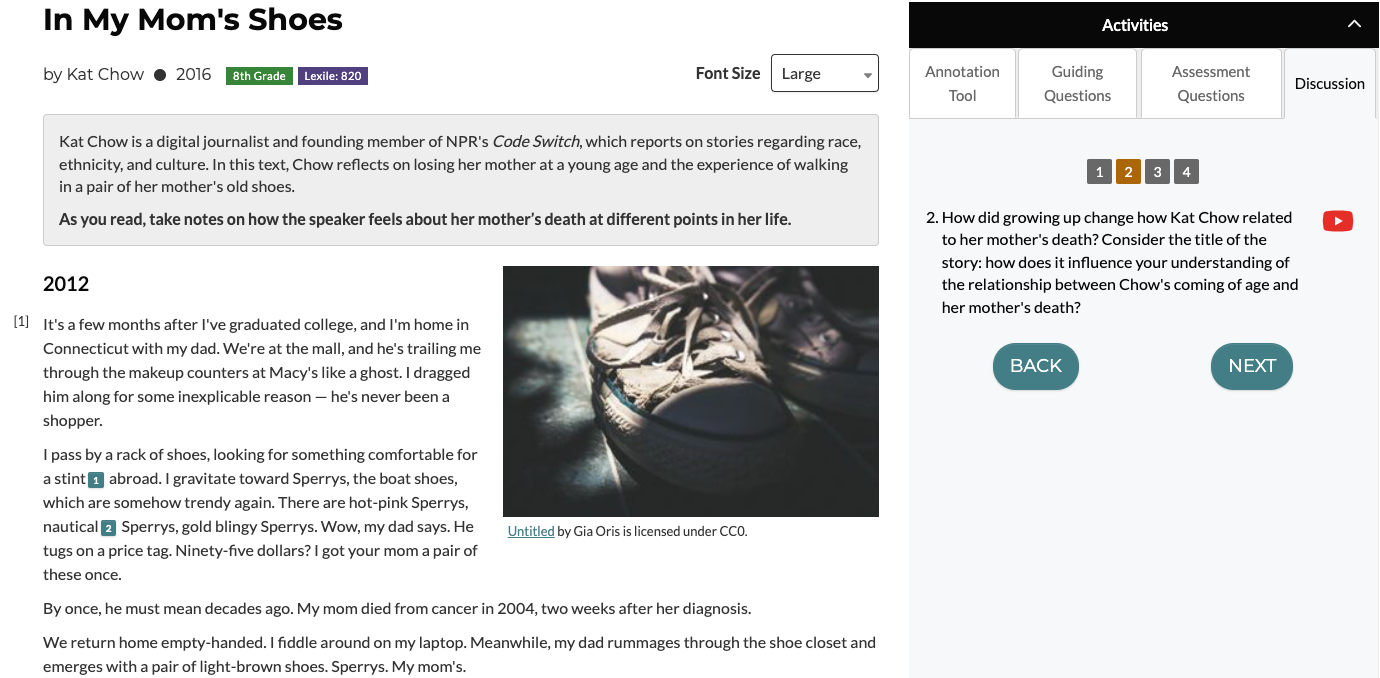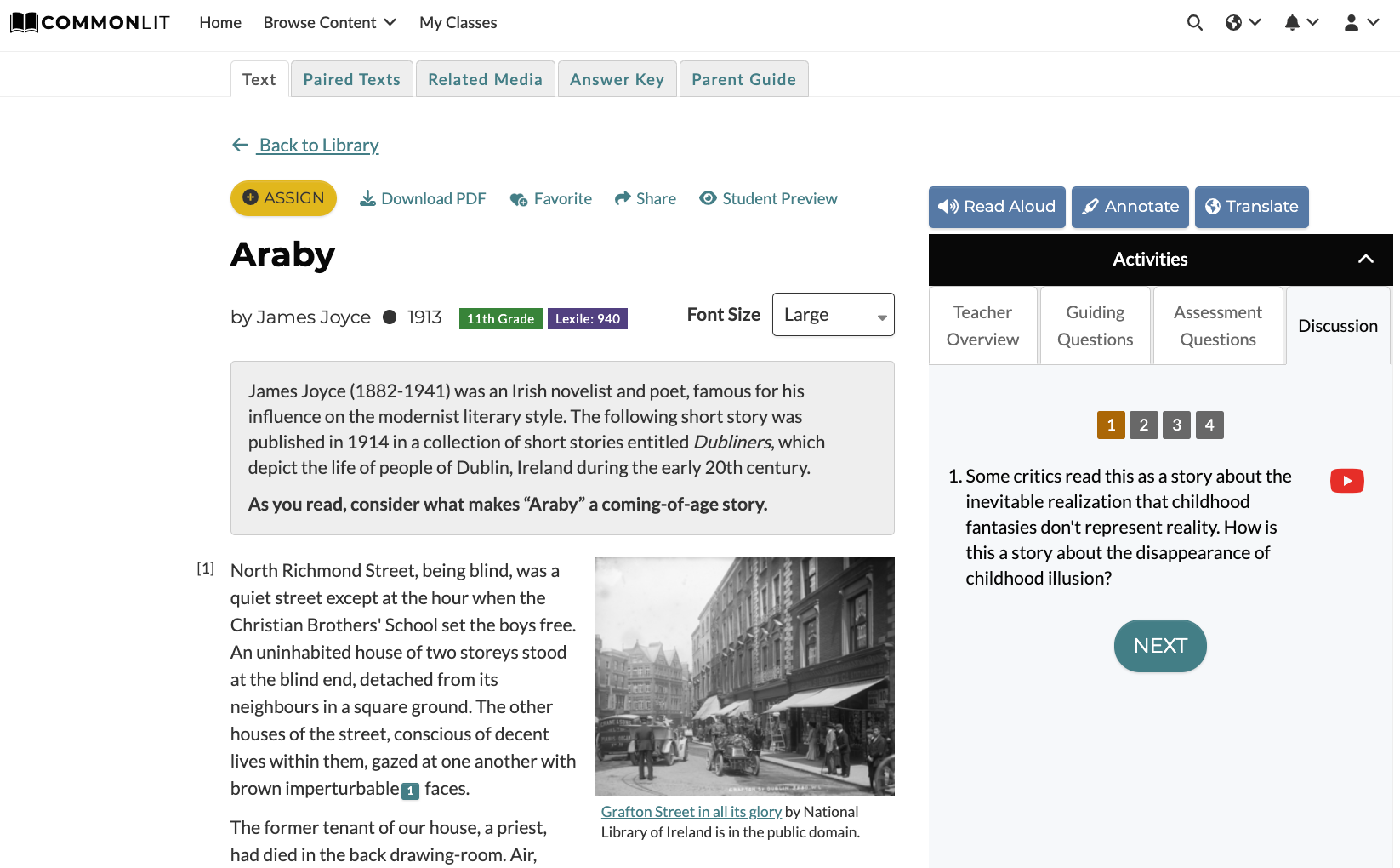 Secondary Classrooms
7 Short Coming-of-Age Stories to Stir Thought-Provoking Classroom Discussions
Secondary Classrooms
7 Short Coming-of-Age Stories to Stir Thought-Provoking Classroom Discussions
Boost Your ELA curriculum with relatable coming-of-age short stories for middle school and high school students.
Looking for short stories with a coming-of-age theme? We’ve compiled several compelling short stories about growing up that will resonate with your students. You can challenge them to practice their critical thinking skills and make text-to-self connections with CommonLit’s discussion questions. In this blog post, we’ll share 7 coming-of-age story examples and discussion questions you can use to support student reading comprehension.
"Growing Up" by Gary Soto (6th Grade)
Remembering how bored she felt on the last family vacation, Maria does not want to go this year and argues with her father about it. Although he eventually allows her to stay behind, Maria feels guilty about their argument and worries about her family during her time alone.
After reading this short coming-of-age story, invite students to examine the personal difficulties that come with growing up with Discussion Question 3: “In the short story, Maria has an argument with her father. Do you think it's common to disagree with your parents as you get older? Why or why not? Have you ever disagreed with your family? How did you resolve the argument?”
"The Medicine Bag" by Virginia Driving Hawk Sneve (7th Grade)
Embarrassed by his grandfather who embraces his Native American identity, Martin hides him from his friends when he comes to visit. When Martin’s grandfather welcomes his friends to learn more about him, Martin’s perspective on his family’s heritage changes.
After students finish reading this short coming-of-age story about family, ask them Discussion Question 3, so they can explore Martin’s character growth: “By the end of the story, Martin appears more understanding of his grandpa and his customs. Do you think this shows that Martin has matured? Why or why not? How has your acceptance of yourself and others changed as you've grown up?”
"In My Mom’s Shoes" by Kate Chow (8th Grade)
In this short coming-of-age story, the author avoids processing grief for her mother’s death. After many years, she faces her grief when she loses her mother’s shoes.
Ask students to explore the author’s growth throughout the story with Discussion Question 2: “How did growing up change how Kat Chow related to her mother's death? Consider the title of the story: how does it influence your understanding of the relationship between Chow's coming-of-age and her mother's death?”

"Sleeping" by Katherine Weber (9th Grade)
The Winters hire a babysitter named Harriet for their son, Charles, but they ask her to not open the door to his room where he is sleeping. After Harriet notices the door to Charles’ room is locked, she realizes that there isn’t a baby and the Winters are grieving their son’s death.
At the end of the story, Harriet gains a new understanding of grief and loss in a quiet exchange with Mr. Winter. To help students understand the theme coming of age and how the protagonist has grown from this experience, you can lead a classroom discussion with Discussion Question 1: “Some literary critics read this story as a ‘coming-of-age’ tale and assume that this experience is one of Harriet's first introductions to the adult world. Based on your critical reading, what does the story reveal about the adult world?”
"Cell One" by Chimamanda Ngozi Adichie (10th grade)
A popular troublemaker, the narrator’s brother, Nnamabia, is sent to a dangerous prison for violating a curfew. During a visit, the narrator finds her brother solemn when he describes the police’s cruel treatment of an elderly man in the same cell as him.
This compelling short coming-of-age story shows how a significant event can influence a young person’s growth. Encourage students to analyze Nnamabia’s character development with Discussion Question 1: “In the story, the author explores how Nnamabia undergoes a change. Do you think he would have experienced this change if he hadn't gone to prison? Why or why not? How do you think Nnamabia is going to behave now that he's out of prison? Describe a significant event in your life that changed your view of the world.”
"Araby" by James Joyce (11th Grade)
Infatuated with his friend’s sister, the narrator promises to bring her a gift from the bazaar. When the narrator’s uncle doesn’t arrive on time to take him, he makes his way alone only to find the bazaar deserted.
At the end of this short coming-of-age story, the narrator matures as he recognizes the falsehood in his romantic fantasies about his friend’s sister. Engage students in a relatable classroom discussion about the protagonist’s personal growth with Discussion Question 1: “Some critics read this as a story about the inevitable realization that childhood fantasies don’t represent reality. How is this a story about the disappearance of childhood illusion?”

"Eleonora" by Edgar Allan Poe (12th Grade)
Before she dies, the narrator promises his first love, Eleonora, that he will never marry anyone else. Overwhelmed by the pain of his loss and desperate to fill the void, the narrator moves to a new city, where he meets and marries another woman.
Despite his promise, the narrator moves on from his first love, showing that he can love again with time and growth. To help with understanding the coming-of-age theme, challenge students to make text-to-self connections with Discussion Questions 4 and 5: “After the death of your first love, is it okay to fall in love again? In the context of this story, how does love change people? Cite evidence from this text, your own experience, and other art, literature, or history in your answer.”
Next Steps
Are you a teacher looking for more great content on CommonLit? Browse the CommonLit Library or come to one of our webinars!
If you are an administrator looking to leverage CommonLit in your school or district, our partnerships team can help. We offer benchmark assessments, professional learning, and more!


